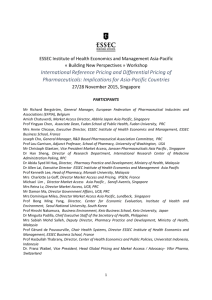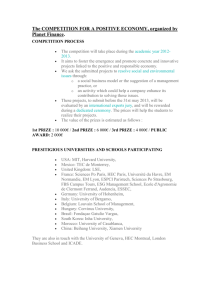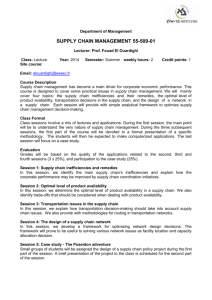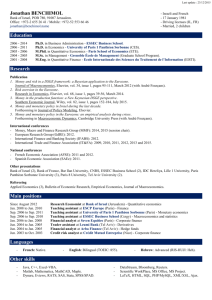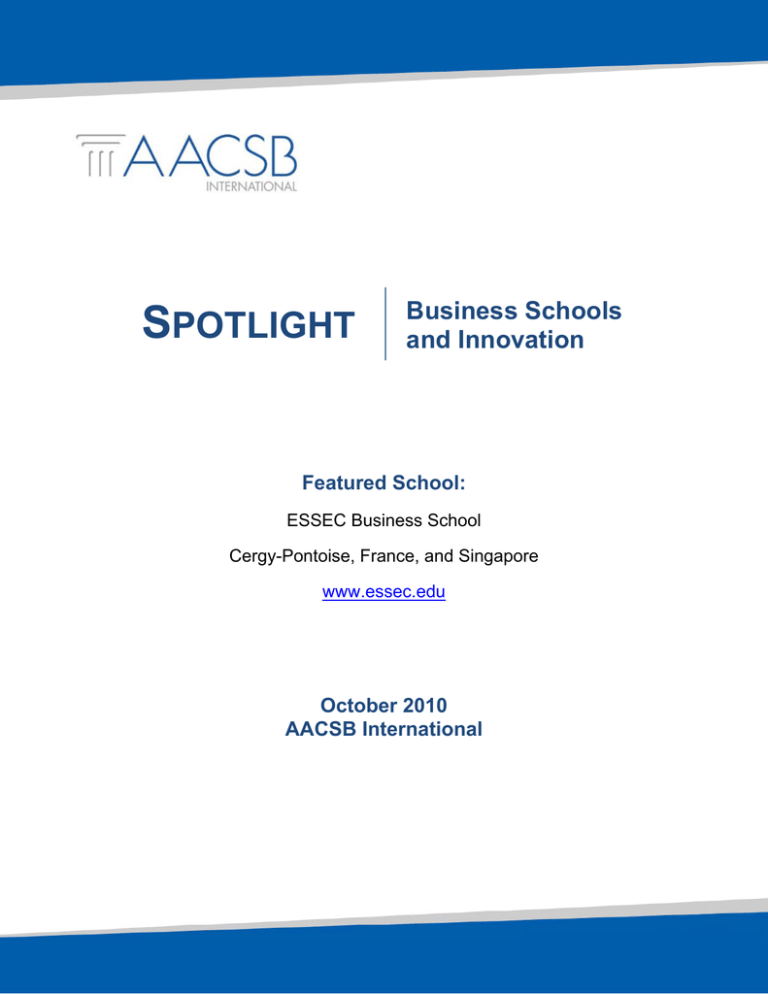
SPOTLIGHT
Business Schools
and Innovation
Featured School:
ESSEC Business School
Cergy-Pontoise, France, and Singapore
www.essec.edu
October 2010
AACSB International
SPOTLIGHT | Business Schools & Innovation
ESSEC Business School | 2
ESSEC Business School
Innovation is one of the primary cultural values at ESSEC Business School, according to Dean and
President Pierre Tapie1. In order to meet the ever-mercurial needs of the business world, ESSEC has
entered into numerous ventures in the past decade designed to promote and support entrepreneurship
and innovative new businesses, both on its own, and in cooperation with other institutions, public and
private.
Tremplin Entreprises
In partnership with the French Senate, ESSEC Business School has been co-organizer of the annual
Tremplin Entreprises2 entrepreneurship competition since 1999. Innovative entrepreneurial projects less
than five years old are judged on their potential and business model by an expert panel of Tremplin’s
partner organizations3, in competition for one of 30 winning places in the fields of Energy & Projects,
Internet & Services, System Applications, and Life Sciences. The top five projects are also awarded
€10,000 prizes. According to ESSEC Ventures Director Julien Morel, who sits on the panel, there were
over 300 competitors in 2010, the 11th cohort of the competition.
ESSEC Ventures
ESSEC Ventures is a part of the ESSEC Group ecosystem4, a group of actors, agencies, events, and
training and support programs for entrepreneurs. Director Morel notes that ESSEC Ventures and the
three business incubators it supports or helps to support are the result of a decision taken in 2000 to
boost the entrepreneurial activities of ESSEC Business School by combining learning experiences with
actual practice. ESSEC Ventures directly administers two of the three incubators:
The first incubator directly administered by ESSEC Ventures is the ESSEC Ventures Incubator5, which
allows ESSEC students who have completed the entrepreneurship program6, and/or demonstrated strong
motivation to work on business creation projects, to receive methodological and logistical support with no
financial contribution required on their part. Since its creation in January 2000, the incubator has
accommodated 90 projects7, and has 35 more currently in-house8.
The second is the ESSEC Ventures Post Incubator9, which focuses on providing advice and support for
new ventures that have already been launched but remain in their initial years of operation. In addition to
ESSEC students and alumni, the Post Incubator also welcomes outside project developers who have not
followed any ESSEC training programs, and grants easy access between students and entrepreneurs. It
also offers a wide range of economically feasible services for business creators. Director Morel says the
Post Incubator is popular with entrepreneurial ESSEC alumni, and is seen as the next step for projects
that have graduated (often with their originators) from the student-focused ESSEC Ventures Incubator.
© AACSB International. All Rights Reserved.
SPOTLIGHT | Business Schools & Innovation
ESSEC Business School | 3
The Post Incubator charges a flat fee to cover the business school’s administrative costs, as well as
variable fees for services rendered, such as coaching and educational courses10.
A €1 million seed fund is also available to provide additional financial support to start-ups. An expectation
that recipients will have been followed by the school for six months to one year prior to being awarded
funding means that recipients tend to be projects that have developed within one of the school’s
incubators. Created in 2006 through a €500,000 investment by ESSEC that was matched by the
Versailles Val d’ Oise/Yvelines Chamber of Commerce, the fund has so far supported 14 projects.
Though none had yet generated revenue as of this writing, Director Morel indicated that 8 of those 14
projects had made it into the second phase of their development, and he was optimistic that in time the
fund will yield financial rewards that will further enable the school to provide support for start-ups.
Paris Biotech Incubator
The third incubator supported by ESSEC Ventures is Paris Biotech11, a public incubator that as of this
writing has housed 50 projects specializing in human health since its founding in 2000. ESSEC is one of
four founding institutions of Paris Biotech; the other co-founders include the Cochin-Port Royal Faculty of
Medicine of the Université Paris Descartes, INSERM, and the Ecole Centrale de Paris (ECP), a leading
French engineering school12. In a collaborative arrangement that draws upon the respective strengths of
the four founders, INSERM and the Université Paris Descartes contribute specifically to the research and
development of health-related innovations, while ESSEC and the ECP provide expertise in
entrepreneurship and engineering technology transfer, respectively. The Université Paris Descartes also
houses the physical infrastructure of the incubator.
The incubator’s organization includes a Board of Directors, which determines the organization’s overall
strategy, an Assessment Committee, in charge of the selection and follow-up of the incubated projects,
Management, which carries out the decisions made by the Board of Directors and Assessment
Committee, and a Steering Committee designated by the French Research Ministry to monitor Paris
Biotech’s activities, both qualitatively and quantitatively. Each founding institution has one representative
on Paris Biotech’s Board of Directors (for example, Pierre Tapie is the Treasurer), and Julien Morel sits as
a member of the Steering Committee. Six staff members provide administrative support to the Paris
Biotech incubator, manage interaction between the partners, and oversee the incubator’s budget of
€100,000 per company.
Paris Biotech fits the definition of an incubator as defined by the French Ministry of Research, via the
Claude Allègre Law on Innovation and Research13. The incubator offers shelter, guidance and support to
entrepreneurs with strong growth potential, leading to the creation and development of innovative biotech
companies. This structure aims to cover different stages of emergence, validation and maturation of the
© AACSB International. All Rights Reserved.
SPOTLIGHT | Business Schools & Innovation
ESSEC Business School | 4
projects it supports. Paris Biotech’s support structure for the creation or development of businesses offers
the following benefits:
Detection and evaluation
Lodging and Logistics
Accompaniment of creative entrepreneurs in shaping the development of business plans,
including the organizational, legal, industrial and commercial aspects.
Training of entrepreneurs in the creation of business enterprises
Use of outside experts to secure the various stages of the creation or development
Linking with scientists, managers, industrialists and financiers
Project creators and their teams are monitored on a monthly basis by the Committees. The services
above are tailored to the needs of each individual project. In order to be eligible for consideration, projects
must be in health-related life sciences, in pre-startup or early-stage startup phase of development, and
have proof of concept and patentability. Projects originating in either the private or public sector are
welcome, but the team must prove its motivation and personal commitment to the project to the
Assessment Committee.
Additionally, according to M. Morel, the projects taken on by Paris Biotech tend to be much more capitalintensive than those of the ESSEC Ventures incubators. As a result, the Incubator typically manages only
about ten projects per year, which is possible by virtue of funding provided by the governments of the City
of Paris, the Ile-de-France region, and the European Union.
Social Entrepreneurship
In January 2003, faithful to its humanist and entrepreneurial tradition, ESSEC became the first business
school in France to create a center of excellence for social entrepreneurship. The Social
Entrepreneurship Chair, an education and applied research program, divides its activities into four main
areas: the creation of organizations with a social purpose; strategy and management in a social economy;
the corporation and sustainable development; and corporate social responsibility. One of the chair’s
operational projects is a social incubator. Named Antropia, it advises and assists ESSEC students and
alumni as they launch and develop innovative ventures with a social mission.
Executive Education
Aside from the traditional ESSEC curriculum for entrepreneurs, the Business School has also launched
three non-degree executive education programs designed specifically for entrepreneurs:
Centrale ESSEC Entrepreneurship Master
© AACSB International. All Rights Reserved.
SPOTLIGHT | Business Schools & Innovation
ESSEC Business School | 5
In September 2009, ESSEC and Ecole Centrale de Paris jointly launched an Advanced Master in
Entrepreneurship, a program that places emphasis upon innovative technologies. The initial success of
this initiative has encouraged the two schools to continue working together. According to Hervé Biausser,
Director of Ecole Centrale Paris, “Ecole Centrale, by completely rethinking its engineering training in
2006-2007, clearly reaffirmed its commitment to training multicultural, cross-disciplinary professionals that
the world needs, who are capable of initiating and pioneering change. Our long cooperation with ESSEC
has reassured us that ESSEC embodies the same values and ambitions as Centrale, particularly the
importance of innovation and international outlook. This strategic alliance with ESSEC undeniably
reinforces the originality, attractiveness and international visibility of the two institutions.”
Pierre Tapie, Dean and President of the ESSEC Group added, “ESSEC traditionally nurtures partnerships
with institutions of excellence and favors alliances between different cultures. ESSEC’s pedagogy has
always been on the cutting edge of teaching. The strategic alliance with Ecole Centrale, which brings
together ESSEC’s fundamental values, innovation, excellence and humanism, with Centrale’s huge
potential for growth in entrepreneurship and international engineering, fits perfectly into this perspective.”
Women’s Entrepreneurship
ESSEC has long been a supporter of equality and diversity within the business world. The recent launch
by its entrepreneurship department, ESSEC Ventures, of the executive program entitled “Women’s
Entrepreneurship” serves as further proof of this commitment. In so doing, ESSEC hopes to improve
access to the knowledge, skills and opportunities that women require in order to set up successful
businesses.
Small Business Takeover
Designed for mature entrepreneurs, this 10-day session track reviews all the necessary steps to takeover
a small business, from negotiating with the current owners to building the business plan and structuring
the LBO.
Mentoring From Private and Public Partners
Finally, since June 2010, ESSEC has partnered with a set of private and public institutions14 to support
the growing needs of new ventures. Partners provide consulting and expertise in areas such as
intellectual property, legal advice, funding, accounting, subsidies, technology expertise, and mentoring by
other entrepreneurs. Partner support is philanthropic, and ESSEC has assigned a total amount of 1000
hours of consulting and support each year. Partners include large companies such as Agregator Capital
Ventures, Alyotech, Auriga Partners, Deloitte, In Extenso, Kereitsu, KPMG, Mov’eo, Réseau
Entreprendre, Total, or the Versailles Val d’ Oise/Yvelines Chamber of Commerce, as well as specialized
© AACSB International. All Rights Reserved.
SPOTLIGHT | Business Schools & Innovation
ESSEC Business School | 6
smaller organizations such as Achrivos, Boost Your Startup (BYS), Esprit d’ Entreprises, Institute for the
Funding of Research, Jurispatent, Luminances, MB Consultants, Saint Sernin Lawyers, Subventium,
Tykya, and the Val d’ Oise Business Angels (VOBA).
Management of corporate mentoring is monitored by the business school and start-up and assigned
meetings with specific partners as needed when in their development phase. As M. Morel describes, a
checkbook for each partner has been printed, which contains single checks giving the right to meet and
get advice to a partner on a specific issue for two hours. The partnerships are set up to reinforce the three
pillars of ESSEC Ventures’ strategy. Entrepreneurs benefit therefore from educational training, in-house
incubation, and external mentoring from public and private partners.
Acknowledgements: AACSB International is grateful for the assistance of M. Julien Morel, Director of
ESSEC Ventures.
© AACSB International. All Rights Reserved.
SPOTLIGHT | Business Schools & Innovation
ESSEC Business School | 7
End Notes
1
ESSEC Business School. (2010) Message from the Dean. Electronic document, http://www.essec.edu/essec‐
business‐school/management‐authorities/deans‐message, accessed April 2, 2010. 2
Tremplin Entreprises. (2010) 11eme Tremplin Entreprises. Electronic document, http://www.tremplin‐
entreprises.senat.fr/, accessed April 2, 2010. 3
ESSEC Business School. (2010) Tremplin’s Partners. Electronic document, http://www.tremplin‐
entreprises.senat.fr/francais/partenaires/partenaires.html, accessed April 2, 2010. 4
ESSEC Business School. (2010) ESSEC Ventures. Electronic document, http://www.essec.fr/lessec/essec‐
ventures/a‐propos‐dessec‐ventures.html, accessed March 19, 2010. 5
ESSEC Business School. (2010) ESSEC Entrepreneurship: Ventures Incubator. Electronic document, http://www.essec.fr/lessec/essec‐ventures/incubateurs/incubateurs.html, accessed March 19, 2010. 6
ESSEC Business School. (2010) ESSEC Entrepreneurship: Full‐time program. Electronic document, http://www.essec.fr/lessec/essec‐ventures/formation.html, accessed March 19, 2010. 7
ESSEC Business School. (2010) ESSEC Entrepreneurship: The year’s projects; Past Projects. Electronic document, http://www.essec.fr/lessec/essec‐ventures/incubateurs/entreprises‐hebergees.html, accessed April 2, 2010. 8
ESSEC Business School. (2010) ESSEC Entrepreneurship: The year’s projects; Current Projects. Electronic document, http://www.essec.fr/lessec/essec‐ventures/incubateurs/entreprises‐hebergees.html, accessed April 2, 2010. 9
ESSEC Business School. (2010) ESSEC Entrepreneurship: The ESSEC Ventures Post‐Incubator. Electronic document, http://www.essec.fr/lessec/essec‐ventures/incubateurs/pepiniere.html, accessed March 19, 2010. 10
ESSEC Business School. (2010) ESSEC Entrepreneurship: Executive education. Electronic document, http://formation.essec.fr/formation‐par‐domaine/entrepreneuriat, accessed April 2, 2010. 11
Paris Biotech Santé. (2010) L’incubateur Santé de Paris. Electronic document, http://www.parisbiotech.org/pbs6/, accessed March 19, 2010. 12
L’Université Paris Descartes, Institut National de la Santé Et de la Recherche Médicale (INSERM), and Ecole Centrale de Paris. (2010) Electronic documents, http://www.univ‐paris5.fr/, http://www.inserm.fr/, and http://www.ecp.fr/, respectively, all accessed April 3, 2010. 13
ERAWATCH. (2010) National profiles: France. Research policy. Electronic document, http://cordis.europa.eu/erawatch/index.cfm?fuseaction=ri.content&topicID=15&countryCode=FR&parentID=12, accessed March 18, 2010. 14
ESSEC Business School. (2010) ESSEC Ventures Partners. Electronic document, http://www.essec.fr/lessec/essec‐
ventures/partenaires.html, accessed September 7, 2010. 15 ESSEC Business School. (2010) ESSEC Executive Education: Entrepreneurship. Electronic document, http://formation.essec.fr/formation‐par‐domaine/entrepreneuriat/, accessed September 7, 2010. © AACSB International. All Rights Reserved.

